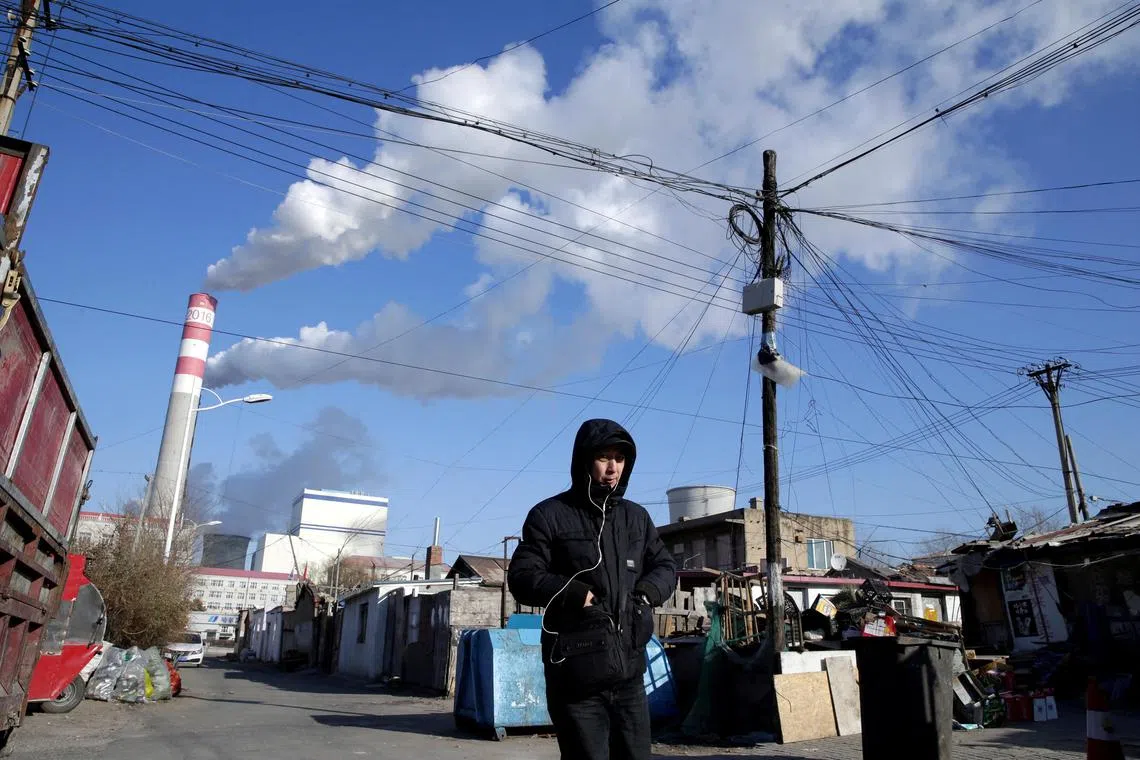China’s Covid-19 curbs could hit commodities demand in peak season
Sign up now: Get ST's newsletters delivered to your inbox

After expanding by 10 per cent in 2021, growth in power demand slowed in the first nine months to 4 per cent, according to the China Electricity Council.
PHOTO: REUTERS
SINGAPORE – The worsening spread of Covid-19 in China
Coal and gas usage is highly contingent on industrial power demand, which will slow if the government continues to impose tighter restrictions that curtail factory activity. Oil markets, meanwhile, will take a hit as fewer people travel by road and air and less fuel is needed to transport goods.
China’s demand for cooking oils, meanwhile, is likely to stay weak as fewer customers frequent restaurants. That will hurt prices for commodities such as palm and soya bean oil, especially ahead of the Chinese New Year holiday in January, usually a peak period for travel and consumption.
It is a bleaker outlook for prices that runs counter to earlier optimism that China was preparing to exit the worst of its virus controls, after the government released a 20-point plan earlier this month refining its zero Covid-19 policy.
“The frequent recurrence of Covid-19 outbreaks and no significant change in the policy to control them make it hard for demand to improve,” said Sinolink Futures senior analyst Wang Xiaoyang. “This will weigh on commodities prices in coming months.”
A record number of virus cases has been accompanied by stunning scenes of public dissent across China,
How Beijing responds is in the balance, with all eyes on whether the protests hasten the end of, or entrench, President Xi Jinping’s signature policy.
S&P Global Commodity Insights expects zero Covid-19 to be maintained at least until mid-2023, said Ms Lara Dong, a senior director at the research firm. Others, including Goldman Sachs Group, have said there is a chance the policy could end sooner, although the exit could be disorderly.
Lockdowns this year have already squeezed demand across a number of key commodities. China is the biggest importer of everything from oil to iron ore and soya beans, and purchases have slowed from the previous year’s levels as the economy has stumbled. The impact on power demand has been particularly marked.
After expanding by 10 per cent in 2021, growth in power demand slowed in the first nine months to 4 per cent, according to the China Electricity Council. S&P’s Ms Dong said she expects demand growth of 4 per cent in the fourth quarter as well, as weaker industrial consumption undercuts the usual increase from heating homes and buildings over the winter.
Demand for natural gas is likely to be worst hit. Consumption, which is largely dependent on imports, is expected to drop this year for the first time in four decades amid soaring global prices and a tepid domestic economy. Cheaper domestic coal has taken up much of the slack as China has raised production to record levels to ensure its energy security.
But Covid-19 outbreaks in major mining regions, especially Shanxi, have crimped coal output in recent months. That has probably put the high hit earlier this year of 12.89 million tonnes a day out of reach, although production will “likely still stay above the government’s target of 12 million tonnes per day to ensure winter demand is met,” said S&P senior analyst Pat See Khoo.
China’s persistence with lockdowns is also expected to depress oil consumption through Chinese New Year.
S&P director Fenglei Shi said she expects demand to decline sequentially in both the fourth quarter and first quarter of 2023.
Activity in the metals sector, by contrast, usually softens over winter, which means that intensified virus restrictions are an even bigger blow to demand in a market that is already contending with elevated prices.
Some metals fabricators are considering bringing forward their Chinese New Year break amid the onset of the virus, said Mr Jiang Hang, head of trading at Yonggang Resources Co.
“This year’s seasonal demand lull may come earlier and last longer,” he said. BLOOMBERG


